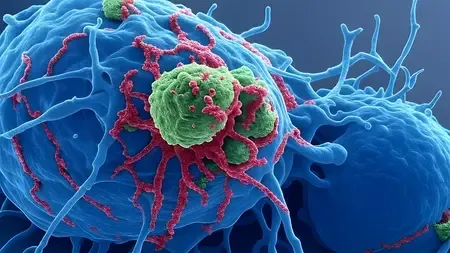Could the Covid mRNA Vaccine Combat Lung and Skin Cancer?

Synopsis
Key Takeaways
- The mRNA vaccine shows potential in treating lung and skin cancer.
- Patients receiving the vaccine alongside immunotherapy lived significantly longer.
- The study analyzed over 1,000 patient records.
- The findings could lead to a universal cancer vaccine.
- Future clinical trials are necessary for validation.
New Delhi, Oct 20 (NationPress) A pioneering mRNA vaccine, which played a crucial role in combating Covid-19, may also have potential applications against lung and skin cancer, as indicated by a recent study.
Researchers from the University of Florida and the University of Texas describe this as a pivotal moment in over a decade of research aimed at utilizing mRNA-based therapeutics to "activate" the immune system against cancer.
During their presentation at the ongoing 2025 European Society for Medical Oncology Congress in Berlin, the research team revealed that patients suffering from advanced lung or skin cancer who received the Covid-19 mRNA vaccine within 100 days of commencing immunotherapy exhibited significantly longer survival rates compared to those who did not receive the vaccine.
While the findings derived from an analysis of over 1,000 patient records are still preliminary, further validation in a randomized clinical trial currently in the planning stages could lead to significant clinical advancements.
According to Elias Sayour, a senior researcher and pediatric oncologist at the University of Florida, "The implications are extraordinary — this could transform the entire field of oncological care."
He added, "We could develop an even more effective nonspecific vaccine to mobilize and reset the immune response, potentially creating a universal, off-the-shelf cancer vaccine for all patients."
Messenger RNA, or mRNA, molecules are present in every cell and carry essential genetic information for protein synthesis.
To determine if the Covid mRNA vaccine functions similarly to a nonspecific vaccine, the team reviewed data from patients with Stage 3 and Stage 4 non-small cell lung cancer and metastatic melanoma treated at MD Anderson from 2019 to 2023.
The most significant differences were observed in patients who were not anticipated to mount a strong immune response, based on their tumor's molecular characteristics and other factors.
Jeff Coller, a leading mRNA scientist and professor at Johns Hopkins University, stated, "The results from this study highlight the remarkable capabilities of mRNA medicines and their transformative potential in cancer treatment."









